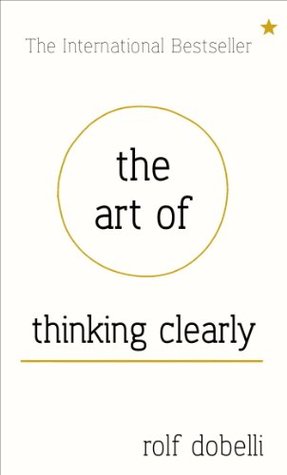More on this book
Community
Kindle Notes & Highlights
by
Rolf Dobelli
Read between
July 20 - July 26, 2024
The omission bias lies behind the following delusions: we wait until people shoot themselves in the foot rather than taking aim ourselves.
In the last chapter, we learned about the association bias – the tendency to see connections where none exist.
In conclusion: though instantaneous reward is incredibly tempting, hyperbolic discounting is still a flaw. The more power we gain over our impulses, the better we can avoid this trap.
In conclusion: verbal expression is the mirror of the mind. Clear thoughts become clear statements, whereas ambiguous ideas transform into vacant ramblings.
John and Mark are victims of effort justification. When you put a lot of energy into a task, you tend to overvalue the result.
As paradoxical as it sounds, the best way to shield yourself from nasty surprises is to anticipate them.
The same applies to you and me: if people don’t double-take when they pass you on the street, the best way to contribute is with greenbacks rather than greenhorn labor.
Instead, the affect heuristic puts risks and benefits on the same sensory thread.
If you like something, you believe that the risks are smaller and the benefits greater than they actually are.
We make complex decisions by consulting our feelings, not our thoughts.
In conclusion: nothing is more convincing than your own beliefs. We believe that introspection unearths genuine self-knowledge.
Warren Buffett does things: ‘Each deal we measure against the second-best deal that is available at any given time – even if it means doing more of what we are already doing.’
In conclusion: first and last impressions dominate, meaning that the content sandwiched between has only a weak influence.
In conclusion: we are drunk on our own ideas. To sober up, take a step back every now and then to examine their quality in hindsight.
The conclusion: insights do not pass well from one field to another. This effect is called domain dependence.
In conclusion: assume that your worldview is not borne by the public. More than that: do not assume that those who think differently are idiots. Before you distrust them, question your own assumptions.
In conclusion: prejudice and aversion are biological responses to anything foreign. Identifying with a group has been a survival strategy for hundreds of thousands of years.
‘Last chances’ make us panic-stricken, and the fear of regret can overwhelm even the most hard-headed dealmakers.
In conclusion: be careful if you win money or if a business gives you something for free. Chances are you will pay it back with interest out of sheer exuberance.
First, stop comparing yourself to others. Second, find your ‘circle of competence’ and fill it on your own. Create a niche where you are the best.
When I find myself suffering pangs of envy, my wife reminds me: ‘It’s OK to be envious – but only of the person you aspire to become.’
In conclusion: be careful when you encounter human stories. Ask for the facts and the statistical distribution behind them. You can still be moved by the story, but this way, you can put it into the right context.
The official term for such behaviour is strategic misrepresentation: the more at stake, the more exaggerated your assertions become. Strategic misrepresentation does not work everywhere.
In conclusion: if you take your problem to an expert, don’t expect the overall best solution. Expect an approach that can be solved with the expert’s toolkit.
In conclusion: certain people make a living from their abilities, such as pilots, plumbers and lawyers. In other areas, skill is necessary but not critical, as with entrepreneurs and leaders. Finally, chance is the deciding factor in a number of fields, such as in financial markets.
Absence is much harder to detect than presence. In other words, we place greater emphasis on what is present than on what is absent.
cherry-picking: selecting and showcasing the most attractive features and hiding the rest.
The fallacy of the single cause is as ancient as it is dangerous. We have learned to see people as the ‘masters of their own destinies’. Aristotle proclaimed this 2,500 years ago. Today we know that it is wrong.
News is to the mind what sugar is to the body: appetising, easy to digest – and highly destructive in the long run.
Kick the habit – completely. Instead, read long background articles and books. Yes, nothing beats books for understanding the world.
Applied to the present day: we cannot say what brings us success. We can pin down only what blocks or obliterates success.


